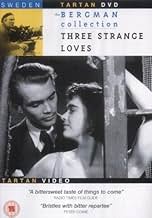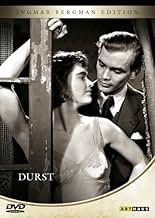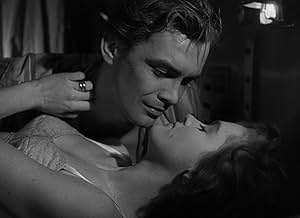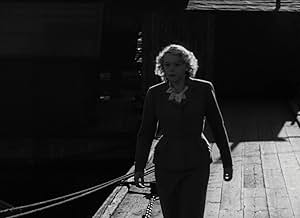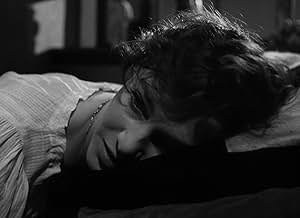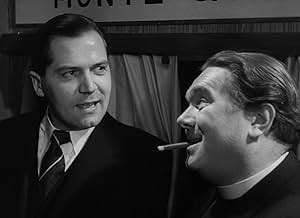IMDb-BEWERTUNG
6,5/10
2929
IHRE BEWERTUNG
Füge eine Handlung in deiner Sprache hinzuA needy couple in a bad marriage travel back to Stockholm after a trip to Italy. Meanwhile, a widow resists seductions from two different persons - her psychiatrist and a lesbian friend.A needy couple in a bad marriage travel back to Stockholm after a trip to Italy. Meanwhile, a widow resists seductions from two different persons - her psychiatrist and a lesbian friend.A needy couple in a bad marriage travel back to Stockholm after a trip to Italy. Meanwhile, a widow resists seductions from two different persons - her psychiatrist and a lesbian friend.
Mimi Nelson
- Valborg
- (as Mimmi Nelson)
Carl Andersson
- Man on Train
- (Nicht genannt)
Wiktor Andersson
- Doorkeeper
- (Nicht genannt)
Verner Arpe
- German Ticket Collector
- (Nicht genannt)
Ingmar Bergman
- Train Passenger
- (Nicht genannt)
Britta Brunius
- Nurse
- (Nicht genannt)
Calle Flygare
- Priest
- (Nicht genannt)
Sven-Eric Gamble
- Glass Worker
- (Nicht genannt)
Inga Gill
- Lady at Hotel
- (Nicht genannt)
Herman Greid
- Newspaper Deliverer
- (Nicht genannt)
Helge Hagerman
- Priest
- (Nicht genannt)
Handlung
WUSSTEST DU SCHON:
- WissenswertesThe first of three theatrical films directed by Ingmar Bergman that he did not write.
- Alternative VersionenThe Tartan region 2 DVD restores the ending of the scene between Viola and her lesbian former schoolmate Valborg, in which the latter tries to seduce the former by getting her drunk. This had been cut by the Swedish censors before the film's original release and had never been seen publicly before 2004.
- VerbindungenReferenced in Dårskapens hus (1951)
- SoundtracksNon più andrai
(uncredited)
from "Le nozze di Figaro"
Music by Wolfgang Amadeus Mozart
Swedish Lyrics by Bernhard Crusell
Sung by Bengt Eklund
Ausgewählte Rezension
The early Bergman films are interesting in how they portray an artist evolving with increased experience. They're not always successful artistic endeavors overall, but they show how a studio system can foster and hone talent through experience.
Thirst tells the story of a young married couple on their way back from a vacation in Italy. We see them in France as they are about to board a train through 1946 Germany back towards Sweden. The woman is haunted by a previous affair and a subsequent abortion all while she nurses a bad knee in the hopes that one day she will dance ballet again. The husband is a penny pinching academic obsessed with coins and who had had an affair with another woman out of, what he calls, pity for her status as a widow. None of this is a secret, all of the sins are out in the open.
The two have the kind of talks typical in Bergman films (in particular his later, post-existential films like Scenes from a Marriage) and come to the conclusion that they should reconcile their differences and try to work through their problems to a happy marriage in the film's final moments.
The problem with the movie is its structure. This could be a case study in a poorly structured story pretty much killing a film. The first twenty minutes are dedicated to flashbacks to the wife's affair with a lieutenant in the Swedish military before we ever meet the husband. The husband's lover is first mentioned about thirty minutes into the movie, and she is introduced a few minutes later in a scene with her cruel psychologist. She then disappears for a half hour. There's also the wife's old dancing friend who appears in another flashback and then shows up with the husband's former lover, trying to seduce her which ends up leading to the lover's suicide.
The problem isn't the events themselves, but the fact that they are bunched together without any real effort to weave it in and out of the other threads. As typical, I read the essay in the Criterion Collection's large book and was unsurprised to discover that the script (which Bergman didn't write) was based on a series of short stories. Considering my issues with the film's structure, it made perfect sense. It felt very staccato with one story going through its beginning, middle, and end before another one took over. It's not quite that, but, especially considering the initial twenty minutes with the wife's lover, it feels very apropos.
I do think that if the movie had been re-arranged it would have worked better. I don't think it's something that purely an editing job would have done. At least some of it would have needed to originate at the script. The husband's lover needed at least one more scene to flesh her out for instance (her first scene with the psychologist is highly emotionally delivered and feels out of place because we had never met her before).
Stylistically, the movie feels very Bergman. The topics he loved are there (the marriage, even the dancer is a performer that he frequently featured). His visual style sometimes feel a little more active than normal, but we clearly see his visual tics such as two people in frame talking to each other, letting actors demonstrate who they are through long exposures to their smaller actions, and strong performances throughout. I just wish the story had been arranged in a way that made sense.
Thirst tells the story of a young married couple on their way back from a vacation in Italy. We see them in France as they are about to board a train through 1946 Germany back towards Sweden. The woman is haunted by a previous affair and a subsequent abortion all while she nurses a bad knee in the hopes that one day she will dance ballet again. The husband is a penny pinching academic obsessed with coins and who had had an affair with another woman out of, what he calls, pity for her status as a widow. None of this is a secret, all of the sins are out in the open.
The two have the kind of talks typical in Bergman films (in particular his later, post-existential films like Scenes from a Marriage) and come to the conclusion that they should reconcile their differences and try to work through their problems to a happy marriage in the film's final moments.
The problem with the movie is its structure. This could be a case study in a poorly structured story pretty much killing a film. The first twenty minutes are dedicated to flashbacks to the wife's affair with a lieutenant in the Swedish military before we ever meet the husband. The husband's lover is first mentioned about thirty minutes into the movie, and she is introduced a few minutes later in a scene with her cruel psychologist. She then disappears for a half hour. There's also the wife's old dancing friend who appears in another flashback and then shows up with the husband's former lover, trying to seduce her which ends up leading to the lover's suicide.
The problem isn't the events themselves, but the fact that they are bunched together without any real effort to weave it in and out of the other threads. As typical, I read the essay in the Criterion Collection's large book and was unsurprised to discover that the script (which Bergman didn't write) was based on a series of short stories. Considering my issues with the film's structure, it made perfect sense. It felt very staccato with one story going through its beginning, middle, and end before another one took over. It's not quite that, but, especially considering the initial twenty minutes with the wife's lover, it feels very apropos.
I do think that if the movie had been re-arranged it would have worked better. I don't think it's something that purely an editing job would have done. At least some of it would have needed to originate at the script. The husband's lover needed at least one more scene to flesh her out for instance (her first scene with the psychologist is highly emotionally delivered and feels out of place because we had never met her before).
Stylistically, the movie feels very Bergman. The topics he loved are there (the marriage, even the dancer is a performer that he frequently featured). His visual style sometimes feel a little more active than normal, but we clearly see his visual tics such as two people in frame talking to each other, letting actors demonstrate who they are through long exposures to their smaller actions, and strong performances throughout. I just wish the story had been arranged in a way that made sense.
- davidmvining
- 24. Nov. 2019
- Permalink
Top-Auswahl
Melde dich zum Bewerten an und greife auf die Watchlist für personalisierte Empfehlungen zu.
- How long is Thirst?Powered by Alexa
Details
- Laufzeit1 Stunde 23 Minuten
- Farbe
- Seitenverhältnis
- 1.33 : 1
Zu dieser Seite beitragen
Bearbeitung vorschlagen oder fehlenden Inhalt hinzufügen



